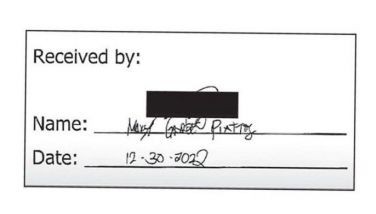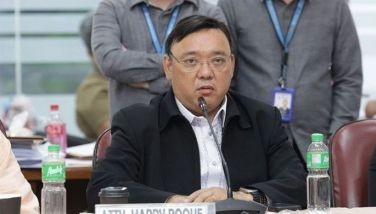GMA may extend PNP chief’s term
November 4, 2001 | 12:00am
After announcing who was next in line for the top post in the Phi-lippine National Police, President Arroyo gave broad hints yesterday that she may extend the term of PNP chief Director General Leandro Mendoza.
"I never said I will retire Larry (Mendoza) in March," the President said during a press briefing at the Mansion House in Baguio City.
Mrs. Arroyo issued the categorical statement in a bid to end speculation that Mendoza will bow out of the service in March 2002, when he reaches the mandatory retirement age of 56, and yield his post to Deputy Director General Hermogenes Ebdane Jr.
Mrs. Arroyo noted that Ebdane is "still very young" and would have ample time to become PNP chief even if Mendoza’s tenure were extended for four more years as allowed by law.
The President said journalists had quoted her out of context on the issue. "Words were put in my mouth," she complained.
She clarified that she was merely responding to a reporter’s question regarding the alleged involvement of Chief Superintendent Reynaldo Berroya, police director for Central Luzon, in a coup plot to capture the top PNP post.
"I only said Berroya won’t do that because he knows very well that Ebdane is next in line," the President told reporters.
The Chief Executive reiterated her clarification during the live broadcast of her radio-TV show May Gloria ang Bukas Mo in the backyard of the Mansion House with former Economic Planning Secretary Winnie Monsod as moderator.
Asked by Monsod if she was satisfied with Mendoza’s performance, the President answered: "Yes, yes, yes."
In the same forum, Mendoza asserted that he was never linked to illegal gambling operations or drug trafficking unlike his controversial predecessor, Sen. Panfilo Lacson.
Mendoza dismissed as mere heckling by his peers allegations that the premature announcement by Mrs. Arroyo that Ebdane would be the next PNP chief has rendered him a lameduck police official.
"The officers corps of the PNP is very professional. We do not dwell on speculations, but on our job," he said.
He also acknowledged that Ebdane was "next in line" in the PNP succession.
"He is the most senior (official) and he is a professional officer," Mendoza noted.
He also brushed aside insinuations that the controversial announcement made by Mrs. Arroyo has triggered demoralization in the ranks.
Mendoza, a member of the Philippine Military Academy Class 1969, was ahead by one year than Ebdane, who graduated from the same school in 1970.
On the alleged coup plot within the PNP, Mendoza said they were still validating the report.
The President described Mendoza as "shy" and must be more assertive about his accomplishments.
"He is so shy and that he must show the people he is Elliot Ness," Mrs. Arroyo said, referring to the fictional super intelligence agent of the television series "The Untouchables."
Mrs. Arroyo appealed earlier to all police officials to stop "treating Mendoza like a lameduck."
For his part, Mendoza said he planned to hold a dialogue with his subordinates to assure them that he was still in command of the PNP.
Rumors had it that divisiveness had set in with the announcement that Ebdane would replace Mendoza.
"I said Jun Ebdane will be the next chief of (the national) police but I did not say when," Mrs. Arroyo stressed.
The President made the admonition after active and retired police and military officials expressed unease at her "premature" announcement of Ebdane’s succession.
Such fears were confirmed when 30 newly promoted police officials, many of them chief superintendents, breached protocol and trooped to Ebdane’s office instead of paying a courtesy call on Mendoza after being sworn in at Malacañang.
Presidential Spokesman Rigoberto Tiglao, however, belied charges that the President’s announcement was premature.
"On the contrary, we believe such announcement even six months before an official is changed, especially in the police, is better for stability. This is a practice in many countries, especially the US," Tiglao said.
"They will know (that) the policies of the current PNP chief will be maintained because the successor has more chances to consult with his predecessor on how to implement policy and how to maintain them," he added.
Tiglao maintained that the announcement was timely because there were rumors of a plot, supposedly dubbed "Black October," to foment a crisis situation in order to project certain police officials as heroes.
"I never said I will retire Larry (Mendoza) in March," the President said during a press briefing at the Mansion House in Baguio City.
Mrs. Arroyo issued the categorical statement in a bid to end speculation that Mendoza will bow out of the service in March 2002, when he reaches the mandatory retirement age of 56, and yield his post to Deputy Director General Hermogenes Ebdane Jr.
Mrs. Arroyo noted that Ebdane is "still very young" and would have ample time to become PNP chief even if Mendoza’s tenure were extended for four more years as allowed by law.
The President said journalists had quoted her out of context on the issue. "Words were put in my mouth," she complained.
She clarified that she was merely responding to a reporter’s question regarding the alleged involvement of Chief Superintendent Reynaldo Berroya, police director for Central Luzon, in a coup plot to capture the top PNP post.
"I only said Berroya won’t do that because he knows very well that Ebdane is next in line," the President told reporters.
The Chief Executive reiterated her clarification during the live broadcast of her radio-TV show May Gloria ang Bukas Mo in the backyard of the Mansion House with former Economic Planning Secretary Winnie Monsod as moderator.
Asked by Monsod if she was satisfied with Mendoza’s performance, the President answered: "Yes, yes, yes."
In the same forum, Mendoza asserted that he was never linked to illegal gambling operations or drug trafficking unlike his controversial predecessor, Sen. Panfilo Lacson.
Mendoza dismissed as mere heckling by his peers allegations that the premature announcement by Mrs. Arroyo that Ebdane would be the next PNP chief has rendered him a lameduck police official.
"The officers corps of the PNP is very professional. We do not dwell on speculations, but on our job," he said.
He also acknowledged that Ebdane was "next in line" in the PNP succession.
"He is the most senior (official) and he is a professional officer," Mendoza noted.
He also brushed aside insinuations that the controversial announcement made by Mrs. Arroyo has triggered demoralization in the ranks.
Mendoza, a member of the Philippine Military Academy Class 1969, was ahead by one year than Ebdane, who graduated from the same school in 1970.
On the alleged coup plot within the PNP, Mendoza said they were still validating the report.
"He is so shy and that he must show the people he is Elliot Ness," Mrs. Arroyo said, referring to the fictional super intelligence agent of the television series "The Untouchables."
Mrs. Arroyo appealed earlier to all police officials to stop "treating Mendoza like a lameduck."
For his part, Mendoza said he planned to hold a dialogue with his subordinates to assure them that he was still in command of the PNP.
Rumors had it that divisiveness had set in with the announcement that Ebdane would replace Mendoza.
"I said Jun Ebdane will be the next chief of (the national) police but I did not say when," Mrs. Arroyo stressed.
The President made the admonition after active and retired police and military officials expressed unease at her "premature" announcement of Ebdane’s succession.
Such fears were confirmed when 30 newly promoted police officials, many of them chief superintendents, breached protocol and trooped to Ebdane’s office instead of paying a courtesy call on Mendoza after being sworn in at Malacañang.
Presidential Spokesman Rigoberto Tiglao, however, belied charges that the President’s announcement was premature.
"On the contrary, we believe such announcement even six months before an official is changed, especially in the police, is better for stability. This is a practice in many countries, especially the US," Tiglao said.
"They will know (that) the policies of the current PNP chief will be maintained because the successor has more chances to consult with his predecessor on how to implement policy and how to maintain them," he added.
Tiglao maintained that the announcement was timely because there were rumors of a plot, supposedly dubbed "Black October," to foment a crisis situation in order to project certain police officials as heroes.
BrandSpace Articles
<
>
- Latest
- Trending
Trending
Latest
Trending
Latest
Recommended




























